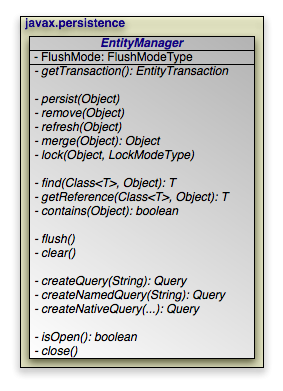Table of Contents
 |
The diagram above presents an overview of the EntityManager
interface. For a complete treatment of the
EntityManager API, see the
Javadoc documentation. Methods whose parameter signatures consist of
an ellipsis (...) are overloaded to take multiple parameter types.
Note
OpenJPA extends the standard EntityManager interface with
the
org.apache.openjpa.persistence.OpenJPAEntityManager
interface to provide additional functionality.
The EntityManager is the primary interface used by
application developers to interact with the JPA runtime. The methods
of the EntityManager can be divided into the following
functional categories:
Transactionassociation.Entity lifecycle management.
Entity identity management.
Cache management.
Queryfactory.Closing.
public EntityTransaction getTransaction ();
Every EntityManager has a one-to-one relation with an
EntityTransaction
instance. In fact, many vendors use a single class to implement both the
EntityManager and EntityTransaction
interfaces. If your application requires multiple concurrent
transactions, you will use multiple EntityManagers.
You can retrieve the EntityTransaction associated with an
EntityManager through the getTransaction
method. Note that most most JPA implementations can
integrate with an application server's managed transactions. If you take
advantage of this feature, you will control transactions by declarative
demarcation or through the Java Transaction API (JTA) rather than through the
EntityTransaction.